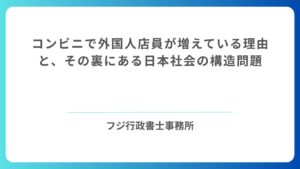「何をしたら評価されるのか、誰も教えてくれない」
日本で働く外国人の中には、「真面目に働いているのに評価されない」「どこが悪いか言われないまま契約が切られた」という経験をした人が少なくありません。上司や先輩から明確なフィードバックがないまま、職場の空気だけで判断されてしまう。それが“日本の職場”の現実です。
Many foreign workers in Japan report that they “work seriously but are not appreciated,” or “suddenly had their contract terminated without clear reasons.” In many Japanese workplaces, evaluation is based on vague impressions, not transparent feedback.
日本の職場には「評価の言語化」がない
「黙っていてもわかるでしょ」「空気を読めば察せるはず」——。日本の職場では、このような“非言語的コミュニケーション”が評価の土台になっていることが多く、基準が明示されないまま「合う・合わない」で人がふるいにかけられていきます。
In Japanese workplaces, evaluation often relies on unspoken expectations. Workers are judged based on how well they “read the air” or fit in, rather than on clearly stated criteria.
評価される行動を「教えない」という構造的な怠慢
外国人にとっては、上司が何を求めているのかを事前に知ることは極めて重要です。しかし、日本人上司の多くは「指導ではなく、観察して評価する」というスタンスをとりがちです。つまり、何が正解かを教えず、できていないことだけを減点方式で処理していく。この構造自体が、外国人の定着を困難にしています。
For foreign workers, knowing what is expected in advance is critical. However, many Japanese supervisors prefer to “observe and judge” rather than explicitly teach. This creates a system where success is not defined, but failure is silently penalized.
例:報連相をしても評価されないケース
「報連相が大事」と言われて実践しても、内容やタイミングが“理想と違う”とみなされるとマイナス評価。しかもその“理想”は説明されず、「前からそうだ」「普通はこうだ」という言葉で片付けられてしまいます。これでは、どれだけ努力しても評価に結びつきません。
Even when foreign workers practice the Japanese principle of “report, communicate, consult” (報連相), if the content or timing doesn’t match unspoken expectations, it may still be viewed negatively. These expectations are rarely explained, often dismissed as “common sense” or “that’s how it’s always been.”
「察して当然」は文化ではなく、評価放棄の言い訳
「察しなかった外国人が悪い」のではなく、「察してもらう前提で評価している上司の責任」が問われるべきです。文化の違いではなく、仕事の評価プロセスを明文化せずに済ませてきた側の怠慢と言っていいでしょう。
It’s not the foreign worker’s fault for failing to guess expectations—it’s the supervisor’s fault for relying on assumption-based evaluation. This is not a cultural gap; it’s a failure to define performance criteria clearly.
契約終了の理由も曖昧にされる
「なんとなく合わない」「協調性がないと感じた」——。契約終了時に外国人が聞かされる“理由”の多くは、具体性に欠けています。実際には“報連相が遅かった”“敬語の使い方が微妙だった”といった、明確に伝えていれば改善できたことばかり。指導もせずに切り捨てるのは、組織の側の説明責任の放棄に他なりません。
Many foreign workers are told their contract is not renewed due to vague reasons like “not fitting in” or “lack of teamwork.” In reality, the issues often involve correctable behaviors—such as timing of communication or language formality—that were never clearly explained. Failing to give feedback is a failure of responsibility.
「評価される行動」を事前に提示している企業は定着率が高い
逆に、入社時に「こういう行動が評価につながる」「こういうことは避けてほしい」と明示している企業では、外国人の定着率が高く、トラブルも少ない傾向があります。評価の“見える化”ができているかどうかが、外国人活用の成否を分けているのです。
In contrast, companies that clearly communicate “what behaviors are valued” and “what to avoid” upon hiring tend to have higher retention rates and fewer problems. Visualizing evaluation standards is a key factor in successfully integrating foreign workers.
外国人側の責任ではなく、評価設計側の問題
「空気を読めない外国人」「日本社会に合わない人材」などとラベルを貼る前に、その人が“何を基準に動けばよかったのか”を振り返る必要があります。評価基準が曖昧なまま人をふるいにかけるのは、評価者としての責任放棄に等しいのです。
Before labeling foreign workers as “not a good fit for Japanese society,” we should ask: “What standards were they expected to follow?” Filtering people without defined criteria is an abdication of evaluative responsibility.
「こんなことで相談していいの?」
—— 大丈夫です! あなたの不安に丁寧に向き合います
フジ行政書士事務所では、日本で暮らす外国人の方が安心して生活できるよう、ビザのことはもちろん、手続き・仕事・暮らしの中で感じる不安や悩みにも寄り添っています。
「誰に相談したらいいか分からない」そんなときこそ、フジ行政書士事務所にご相談ください。
あなたにとっていちばん良い形を、一緒に考えていきます。
※LINEをご利用でない方は、▶ お問い合わせフォームはこちら からもご相談いただけます。
あわせて読みたい
👉 フジ行政書士事務所のご紹介はこちら
👉 外国人を怖がる上司の正体
👉 言いたいことを言う外国人は悪いのか?
👉 公式サイトはここをクリック
👉 LINE公式アカウントはこちら
または、下のQRコードをLINEアプリで読み取ってください。










